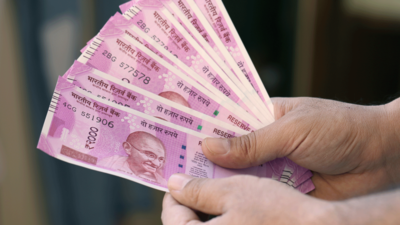"RBI Sets Deadline: What Happens If You Fail to Exchange Rs 2,000 Notes by September 30?"
The Reserve Bank of India (RBI) has issued a clear deadline, stating that the Rs 2,000 denomination banknote will lose its value after September 30, 2023. Any remaining Rs 2,000 notes not exchanged by this date will essentially become just pieces of paper. The central bank had previously fixed this deadline as part of a time-bound exchange initiative. While there were reports suggesting a possible extension of the deadline until the end of October, the RBI clarified that this was not the case.
Until September 30, individuals can exchange their Rs 2,000 currency notes at the 19 regional offices of the RBI or their nearest bank branches. It's important to note that there is a limit of Rs 20,000 in Rs 2,000 notes that can be exchanged for lower denominations at one time.
The Rs 2,000 denomination banknotes were introduced in November 2016 to address the immediate currency requirements of the economy following the demonetization of Rs 500 and Rs 1,000 banknotes. Despite the withdrawal of these high-value notes from circulation, the Rs 2,000 notes remained legal tender. However, the RBI advised banks to cease issuing these banknotes immediately.
As of the latest data, approximately 93% of the Rs 2,000 banknotes have returned to the banking system since the RBI's decision in May to withdraw the high-value note from circulation. The total value of Rs 2,000 banknotes received back from circulation was reported to be Rs 3.32 lakh crore up to August 31, 2023.
Starting from October 1, Rs 2,000 currency notes will continue to be legal tender, but they can only be exchanged with the RBI. A non-account holder can also exchange these banknotes up to a limit of Rs 20,000 at a time at any bank branch. However, standard Know Your Customer (KYC) details and other legal deposit norms will still apply. Individuals have the option to exchange Rs 2,000 notes at the 19 Regional Offices (ROs) of the RBI or at any nearby bank branch.
Certainly, here are 20 additional topics for a more comprehensive news coverage:
1. **Demonetization Impact:** Explore the lasting effects of the 2016 demonetization, such as the shift to digital payments and its impact on the Indian economy.
2. **RBI Policies:** Discuss the Reserve Bank of India's monetary policies, including interest rate decisions and their effects on the financial markets.
3. **Currency Circulation:** Analyze the circulation of various denominations of currency in India and their role in daily transactions.
4. **Financial Inclusion:** Investigate efforts to improve financial inclusion in India, including the Pradhan Mantri Jan Dhan Yojana and its implications for banking services.
5. **Digital Wallets:** Examine the popularity of digital wallets like Paytm and PhonePe and their role in India's cashless economy.
6. **ATM Network:** Assess the availability and usage of ATMs in India, considering the impact of ATM closures and digitization.
7. **Cryptocurrency Regulation:** Discuss the regulatory landscape for cryptocurrencies like Bitcoin and their acceptance in India.
8. **Bank Mergers:** Explore recent bank mergers and their consequences on the Indian banking sector.
9. **Economic Growth:** Evaluate India's economic growth prospects, taking into account factors like GDP growth and foreign investment.
10. **Financial Literacy:** Examine initiatives to improve financial literacy in India and their significance in promoting responsible financial behavior.
11. **Taxation Changes:** Investigate changes in taxation policies and their effects on businesses and individual taxpayers.
12. **Investment Trends:** Analyze investment trends in India, including preferences for stocks, real estate, and mutual funds.
13. **Foreign Exchange Reserves:** Discuss India's foreign exchange reserves, their growth, and their role in managing economic stability.
14. **Government Debt:** Examine India's government debt levels and their implications for fiscal responsibility.
15. **Credit Ratings:** Explore India's credit ratings and their impact on borrowing costs and investment attractiveness.
16. **Retail Inflation:** Analyze trends in retail inflation and their consequences for consumers and policymakers.
17. **Infrastructure Development:** Investigate major infrastructure projects and their role in economic growth and job creation.
18. **Trade Agreements:** Discuss India's participation in international trade agreements and their effects on imports and exports.
19. **Agricultural Policies:** Evaluate government policies related to agriculture, subsidies, and their influence on the rural economy.
20. **Stock Market Volatility:** Examine stock market fluctuations, including factors like global events, corporate earnings, and investor sentiment.
These topics cover a wide range of financial and economic aspects that can provide a well-rounded view of India's financial landscape and its implications for businesses and individuals.


Comments
Post a Comment